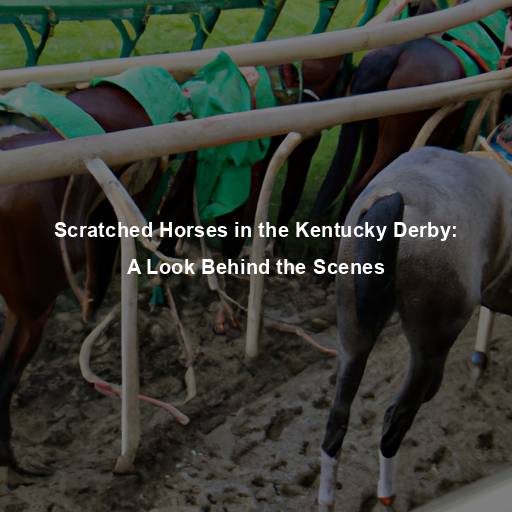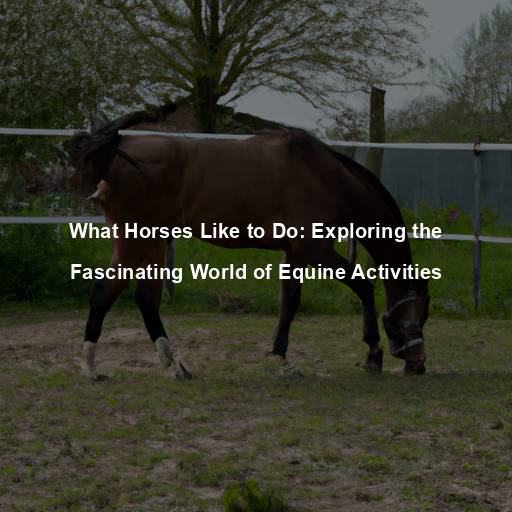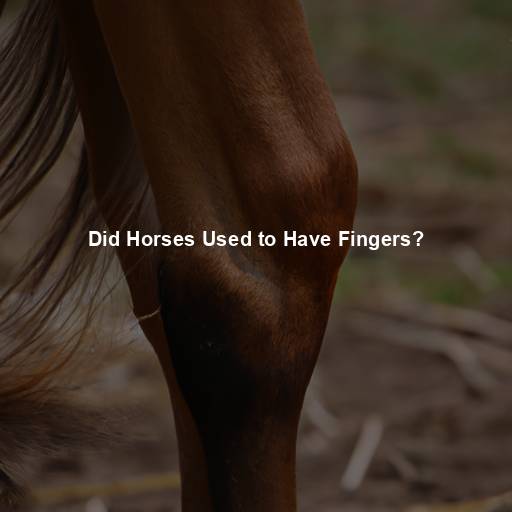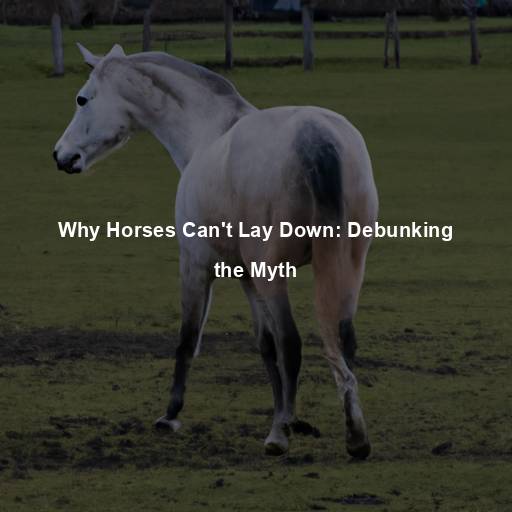How Do Horses Get Their Names?
Last Updated on July 19, 2023 by Evan
Contents [hide]
- 1 The Tradition and Significance of Naming Horses
- 2 Historical Influences on Equine Naming
- 3 Personal Connections and Creativity
- 4 The Role of Registration and Competition
- 5 The Evolution of Equine Naming Trends
- 6 The Bond Between Horse and Owner
- 7 Cultural Significance of Equine Names
- 8 Unconventional Naming Approaches
- 9 The Ever-Evolving Landscape of Equine Naming
- 10 FAQs: How do horses get their names?
The Tradition and Significance of Naming Horses
Horses have been our loyal companions for centuries, serving us in various capacities, whether it be in agriculture, transportation, or sport. As we develop a bond with these majestic creatures, we often find ourselves wondering, how do horses get their names? Naming a horse carries a long-standing tradition and holds significant meaning. Join us as we delve into the fascinating world of equine nomenclature and explore the various factors that influence the naming of these magnificent animals.
Historical Influences on Equine Naming
Cultural and Geographical Factors
Since time immemorial, the enigmatic bond between humanity and horses has transcended borders and shaped diverse cultures, weaving an intricate tapestry of equine nomenclature. A captivating embodiment of grace and fortitude, Arabian horses bear names that evoke the mystique of their Middle Eastern lineage. In contrast, the illustrious American Quarter Horses garner appellations inspired by legendary Western icons and landscapes, an enchanting tribute to their heritage on the wild frontiers of America.
Breeding and Lineage
In the world of horse breeding, lineage and bloodlines hold immense value. Breeders often name their horses to honor their parentage, highlighting the prestigious lineage that the horse comes from. These names can also help potential buyers identify the horse’s genetic background and potential for specific disciplines, such as racing or dressage.
Achievements and Milestones
Throughout the annals of equestrian history, a profound tradition has emerged – bestowing noble steeds with names that encapsulate their profound feats and extraordinary triumphs. These monikers, resonating with a resplendent legacy, pay homage to their unparalleled prowess and indelible mark on the world of equine excellence. From the timeless legend of Secretariat, thundering across the racetrack with unrivaled grace, to the majestic Valegro, illuminating the Olympic arena with unrivaled mastery – these celestial appellations evoke a mesmerizing sense of wonderment and reverence, forever etching their names upon the tapestry of greatness.
Personal Connections and Creativity
Appearance and Personality
When it comes to naming horses, we often find ourselves captivated by their remarkable physical attributes and captivating personalities. From striking markings that leave us in awe, to enchanting coat colors that defy the norm, these features shape the very essence of their names. Picture a horse with a gentle and serene disposition, gracefully carrying their noble spirit – their name becomes a serene melody, like a whisper in the wind. On the other hand, a horse bursting with boundless energy and an exuberant nature deserves a name that beautifully captures their vivacity and zest for life.
Superstitions and Beliefs
Across the annals of time, horse naming has been an enigmatic dance between superstitions and beliefs. The intricate tapestry of equine nomenclature is woven with threads of luck and the quest to ward off the ethereal forces. Owners tread wisely as they select names like “Lucky” or “Fortune,” striving to embellish their equine allies with charms of triumph, riches, and a flourishing voyage on the winds of fortune.
The Role of Registration and Competition
Breed Associations and Registration Requirements
Choosing the perfect name for a horse can be quite a perplexing task, especially for those involved in competitive events or specific breeds. Breed associations offer a burst of guidelines and requirements that must be followed when it comes to naming our majestic equine companions. From limitations on name length to the inclusion of specific prefixes or suffixes, it’s crucial to avoid any duplicate monikers and adhere to these perplexing regulations. This not only maintains uniformity but also aids in accurate identification within the vibrant and diverse breed community.
Show Names and Barn Names
In the captivating realm of equestrian competitions, horses gracefully carry not just one, but two distinctly enchanting identities. These majestic creatures adorn themselves with an eloquent show name, a regal title that pulsates with their noble lineage or a lavish grandeur that leaves spectators in awe. However, in the realm of everyday interactions and intimate stable encounters, horses prefer to embrace a more practical persona, dubbed their barn name, a moniker that exudes simplicity and ease of use, allowing for effortless communication and a seamless bond between horse and human. With its concise, mellifluous quality, the barn name becomes a precious link, forging a steadfast connection within the horse’s sanctuary.
The Evolution of Equine Naming Trends
Traditional Names
For centuries, the equestrian realm has embraced the allure of traditional names, drawing inspiration from bygone eras and bestowing a regal sense of sophistication. Whether it’s the graceful lilt of “Lady,” the noble resonance of “Duke,” or the midnight mystique of “Midnight,” these timeless monikers effortlessly mesmerize and captivate. Revered by horse enthusiasts worldwide, these names stand as a testament to the enduring charm and magnetic pull of age-old elegance.
Unique and Creative Names
Over the past few years, equestrian enthusiasts have been indulging in an intriguing trend: the emergence of unconventional and imaginative names for their beloved horses. With a quest for individuality, owners are passionately embracing monikers that break the mold and capture the distinctive spirit of their equine companions. Through playful wordplay and whimsical combinations, these unconventional names inject an exhilarating dose of mirth and ingenuity into the age-old process of naming horses.
Trendy Names
Just like in the ever-changing world of popular culture, the equestrian community has its own unique trends when it comes to naming horses. These trends often mirror wider cultural influences and sometimes even take inspiration from popular films, books, or music. However, it’s worth noting that going for a trendy name can sometimes mean sacrificing long-term relevance. It’s crucial to weigh the allure of a fashionable name against its timeless quality before deciding on the perfect moniker for your majestic equine companion.
The Bond Between Horse and Owner
The process of naming a horse goes beyond mere words; it represents the beginning of a profound bond between horse and owner. The name becomes an integral part of the horse’s identity, resonating with their unique qualities and capturing the essence of their spirit. Whether rooted in tradition, personal connection, or sheer creativity, the name becomes a symbol of the enduring partnership and unwavering trust that exists between horse and human.
As horse enthusiasts, we can’t deny the fascinating influence of pop culture on the names we give our cherished equine companions. From iconic movie characters to chart-topping musicians, these names carry a certain allure and mystique that adds a burst of excitement to the equestrian world. So, the next time you cross paths with a horse, take a moment to discover the story behind their name – you might be surprised by the captivating connections between our favorite films, songs, and these majestic creatures. Get ready to dive into a world of equine names filled with bursts of creativity and perplexing inspirations!
The Silver Screen Inspiration
When it comes to naming horses, the world of cinema has left an indelible mark. Movies like “Black Beauty,” “Seabiscuit,” and “Spirit: Stallion of the Cimarron” have not only enthralled audiences but have also sparked a wave of equestrian nomenclature. Horse owners find themselves enchanted by these on-screen equine heroes, drawing inspiration and expressing admiration through the names they bestow upon their own majestic companions. From the silver screen to the stables, the impact of these iconic films on the horse naming tradition is both captivating and perplexing.
Music and Equine Naming
Throughout the vast realm of music, the enigmatic force of equine allure has woven an enchanting tapestry. From the heartfelt twangs of country melodies to the electrifying beats of rock and pop anthems, horses have galloped into the very essence of musical inspiration. Iconic songs such as “Wild Horses” by The Rolling Stones and “A Horse with No Name” by America have etched these regal creatures into the very fabric of our collective imaginations. As if under an enchanting spell, horse owners find themselves drawn to select names that harmonize with the resonating melodies that have captured their souls.
Cultural Significance of Equine Names
Native American Influence
Imbued with a profound veneration for equine companionship, Native American culture elegantly weaves the essence of their beliefs into the names bestowed upon these majestic creatures. Drawing from a heritage steeped in the art of horsemanship, the names grace and resonate with deep significance. “Running Bear,” “Swift Wind,” and “Dancing Feather” artfully conjure an ethereal connection to the natural world, nurturing a spiritual dance between man and horse. Intrinsic to honoring tribal ancestry, these names exalt the timeless alliance between rider and steed, a testament to their enduring legacy.
European Traditions
In European cultures, horses have been an integral part of history, folklore, and mythology. Names inspired by European traditions often draw from legends, heroic tales, and mythical creatures. Names like “Pegasus,” “Valhalla,” or “Excalibur” pay homage to the mythical creatures and legendary heroes that populate European folklore. These names add an air of mystique and enchantment to the horses that bear them, creating a sense of awe and wonder.
Eastern Influences
Across the vast tapestry of Eastern cultures, horses stand as an emblem of profound meaning, weaving together threads of strength, loyalty, and grace. Imbued with the wisdom of ancient Chinese, Japanese, and Indian folklore, the names inspired by these traditions envelop a richness that stirs the soul. As horse owners who cherish the allure and enlightenment of Eastern cultures, one may be captivated by the resonating essence of names like “Kazuki,” “Kiran,” or “Ling,” breathing life into a tribute that honors the deep-rooted heritage and enigmatic symbolism entwined with these magnificent creatures.
Unconventional Naming Approaches
Numerical Naming
In some instances, horse owners may opt for numerical names, assigning a specific number as the horse’s name. This unconventional approach can be seen in racing, where horses are often designated with numbers to aid in identification during races. While these numerical names may lack the lyrical appeal of traditional names, they serve a practical purpose and are widely recognized within the racing community.
Color-Based Names
The physical appearance of a horse, particularly its coat color, can serve as inspiration for its name. Color-based names like “Chestnut,” “Bay,” or “Grayson” highlight the distinctive hues and patterns that adorn a horse’s coat. These names not only add visual imagery but also provide a quick reference to the horse’s appearance, making them easily identifiable within equestrian circles.
Name Mashups
For those seeking a more playful and inventive approach to naming their horses, name mashups offer a creative solution. Combining elements from different words or names, horse owners can create unique monikers that reflect their horse’s individuality. Names like “Braveheart,” “Starlight,” or “Moonshadow” exemplify this trend of blending words to form imaginative and distinctive names.
The Ever-Evolving Landscape of Equine Naming
As with any aspect of language and culture, equine naming trends continue to evolve over time. New names emerge, influenced by changing societal norms, cultural shifts, and individual preferences. As the equestrian community expands, diverse naming conventions are embraced, celebrating the uniqueness of each horse and their owner’s personal connection.
In the digital age, the internet has provided a platform for horse owners to share and seek inspiration for naming their horses. Online forums, social media groups, and dedicated websites offer a space for discussions and idea exchanges, helping horse owners navigate the naming process with a wealth of resources and advice.
FAQs: How do horses get their names?
How are horses given their names?
Horses can receive their names in a variety of ways. There are several common methods used to assign names to horses. In some cases, owners may choose names based on the horse’s appearance or physical characteristics. Others may choose names inspired by the horse’s lineage or ancestry. Additionally, some owners may select names that hold personal significance or reflect the horse’s personality traits. Ultimately, the process of naming a horse is highly individual and can vary depending on the owner’s preferences and the horse’s unique qualities.
The responsibility of naming a horse typically lies with the owner or the person in charge of the horse’s care. Whether it is an individual owner or a syndicate representing a group of owners, the decision ultimately rests with them. In some cases, horse owners may consult with trainers, breeders, or industry professionals to assist in choosing a suitable name for their horse. However, the final authority over the name selection remains in the hands of the owner or the ownership group.
Are there any naming regulations or restrictions for horses?
The world of horse naming is a labyrinth of perplexing regulations, a web spun by equine organizations and governing bodies that often leaves us scratching our heads in wonder. Take, for instance, the esteemed Thoroughbred racehorses registered with The Jockey Club, who must dance delicately within the confines of strict naming guidelines. These guidelines, like invisible restraints, restrain them from using names already taken, ones that stretch beyond a certain length, or those that dare to venture into the realm of inappropriate or offensive content. Not to be outdone, other breed registries and equestrian organizations add their own layers of complexity, ensuring that the name of each horse stands as a beacon of individuality and clarity in this chaotic world.
Can you change a horse’s name?
Yes, horse owners have the option to change a horse’s name, although the process may vary depending on the specific circumstances. In some cases, owners may decide to change the name of a horse they have newly acquired or if they feel that the current name does not suit the horse anymore. However, it is important to note that certain organizations may have restrictions or requirements for name changes. Often, formal requests or applications need to be submitted to the relevant governing body, along with appropriate documentation and fees, to officially change a horse’s name.
Are there any benefits to having a unique or catchy name for a horse?
While there are no specific advantages related to performance or health, having a unique or catchy name for a horse can generate interest and make them more memorable in certain contexts. For example, in horse racing or show jumping, a captivating name can attract attention from fans, spectators, and potential sponsors. Additionally, a distinctive name might help differentiate the horse from others, making it more recognizable and marketable in promotional materials or media coverage. Ultimately, the impact of a horse’s name on its success depends on several factors, but having a memorable name can contribute to its overall appeal in the equestrian community.







